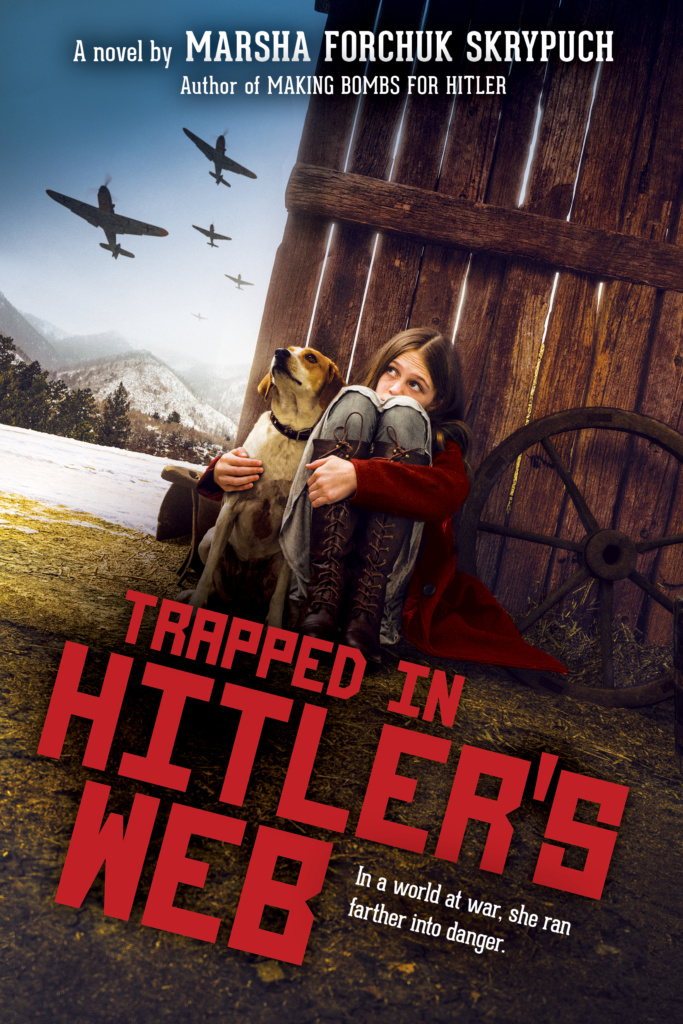
Video of launch: Trapped in Hitler’s Web

writes about war from a young person's view #bannedbyrussia

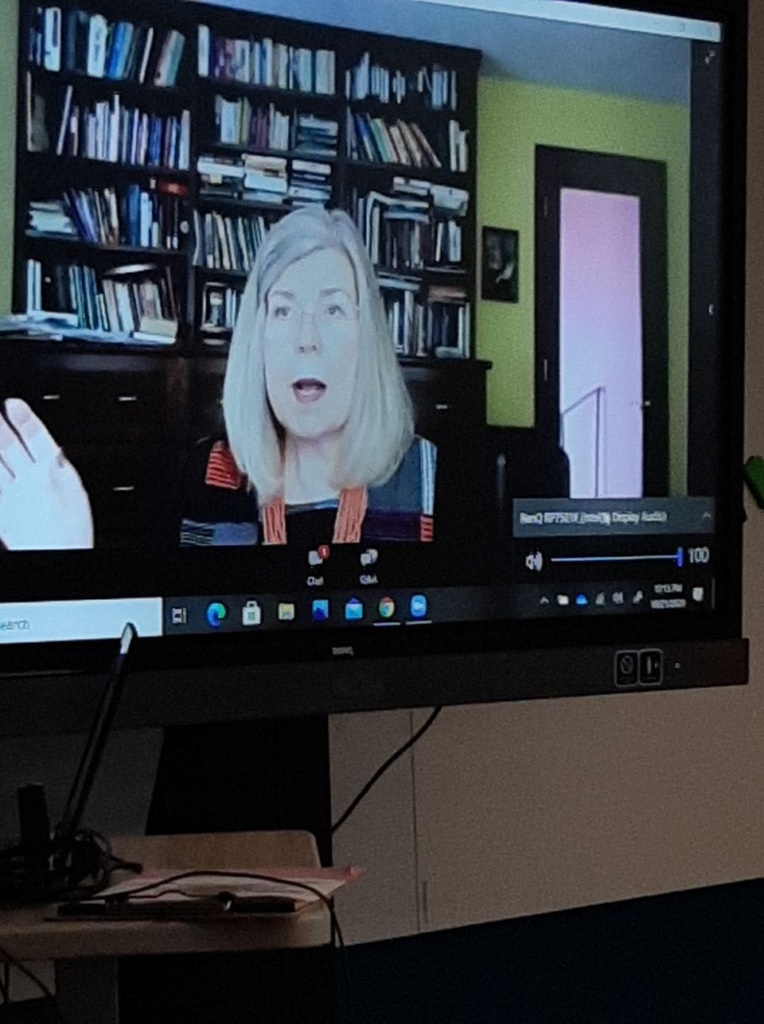
The Brantford Public Library hosted the Zoom book launch for Trapped in Hitler’s Web, with children’s librarian Anna Flaherty as the moderator. It was a wonderful conversation, with live Q&A from all over North America. I was particularly thrilled that quite a number of classes participated. This photo was taken by Kristina Hart at Boulder Peak Intermediate. We can’t hug during this pandemic, and I can’t autograph in person, but I was able to reach far more people with this book launch than I’ve ever been able to with past book launches. (I’m still missing the hugs though ….)
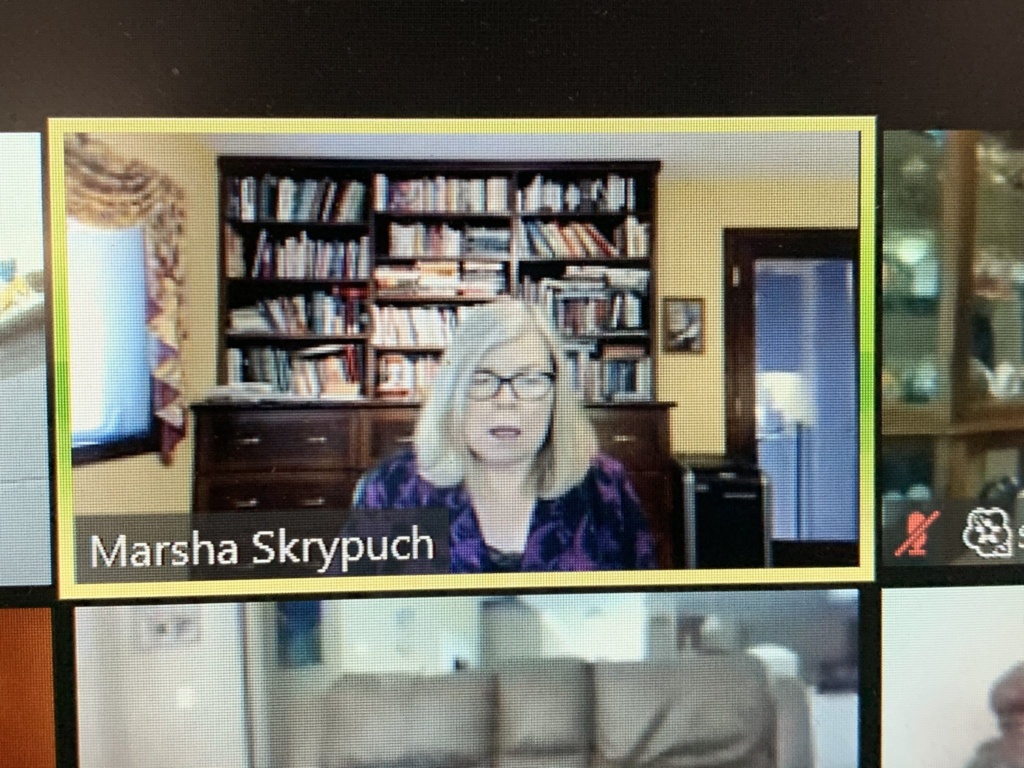
I am THRILLED that The War Below (Scholastic US) is listed on Amazon.com as a #1 New Release for Children’s Holocaust Fiction, but please don’t be confused by the error on this page. This book is not #4 of my WWII series. This novel is part of a trilogy. This novel was previously published by Scholastic Canada as Underground Soldier in 2014.
The error has been reported to Amazon.com:
Same books, different editions:
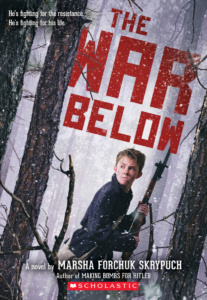 The Nazis took Luka from his home in Ukraine and forced him into a labor camp. Now, Luka has smuggled himself out — even though he left behind his dearest friend, Lida. Someday, he vows, he’ll find her again.
The Nazis took Luka from his home in Ukraine and forced him into a labor camp. Now, Luka has smuggled himself out — even though he left behind his dearest friend, Lida. Someday, he vows, he’ll find her again.
But first, he must survive.
Racing through the mountains, Luka evades capture by both Nazis and Soviet agents. When he meets the underground Ukrainian Insurgent Army, he knows that is where he belongs: fighting Nazis and Soviets alike. But the desperate rescues and guerilla raids put Luka back in the line of fire. Can he persevere long enough to find Lida again or make it back home where his father must be waiting for him?
Marsha Forchuk Skrypuch, author of Making Bombs for Hitler, delivers another action-packed story of daring quests and fights for survival. Inspired by true stories, this novel is a testament to the strength of the human spirit in the face of war. This book was originally published in Canada as Underground Soldier.
“A page-turning window into a complex piece of World War II history.” Kirkus
“Skrypuch offers a compelling, visceral novel of survival that provides an unusual view of the war and the almost legendary Ukrainian Insurgent
Army.” Booklist
“compelling work of historical fiction … conveys the brutality faced by European citizens caught between the Soviets and the Nazis during World War II. …This story, full of numerous acts of compassion and valor, sheds welcome light on a less familiar battleground of World War II.” Publishers Weekly
Kiss the Book review
Ms. Yingling Reads review
Historical Novel Society review: Hidden among corpses, Luka Barukovich anxiously waits for the truck to drive through the gates. It is his only chance for life and freedom, yet escaping the slave labor camp means he must leave behind his closest friend, who urged him to flee. Someday, if he survives, he will find her, but now he embarks on the long journey home where he hopes to reunite with his father, whom the Soviets sent to Siberia. Getting to Kyiv is fraught with danger, especially for an eleven-year-old clad only in a hospital gown and with a thigh wound crudely stitched by a Nazi doctor after a bomb exploded at the metal-works factory.
Luka takes refuge in a barn, where he uses the knowledge of natural remedies that his father and grandfather taught him to tend his injury. In need of food and clothing to protect him from the wintry chill, he risks entering the farmhouse. The old couple living there catches him, but instead of turning him in, they share their food and home. After being so long deprived, their kindness seems a godsend, until they lock him in a bedroom with an SS officer’s uniform in the closet.
The War Below takes place during the last two years of World War II, and while written for children, even adults will find this a riveting novel. Skrypuch’s chilling portrayal of escape vividly captures life on the run amidst the savagery of war. Her characters are skillfully drawn and deftly show that sometimes we must do the unthinkable to survive. She also introduces a lesser-known aspect of this conflict—the Ukrainian Insurgent Army and their fight against the prejudices that drive others to enslave and kill. In spite of heart-wrenching sorrow, vicious slaughter, and unexpected trickery, hope remains eternal.
The Children’s War review: The novel Making Bombs for Hitler is the story of Lida Ferezuk, who was taken from her home in the Ukraine, put in a cattle car and sent to a slave labor camp, where she eventually ended up making bombs for the Nazis. In that same cattle car was Luka Barukovich, also taken from his home in Kyiv, Ukraine. Lida and Luka become friends and watch out for each other in the slave labor camp, but when the opportunity for escape arises, Luka decides to risk it at Lida’s urging.
The War Below begins in 1943 with Luka hiding in a truckload of corpses, hoping to escape the camp, return to his home in Kyiv and find his father, who had been taken away by the Nazis and sent to Siberia. Now, wounded, wearing a hospital gown and bare foot, Luka jumps from the truck about two kilometers from the camp, in the rain, and finds his way to what appears to be an abandoned farm. The farm, however, is the home of Helmut and Margarete, an elderly couple who feed and clothe Luka, and urge him to remain with them until spring. But when he discovers that their son is a power-hungry officer from the camp he has just escaped, Luka decides it is time to leave.
By now, the Nazis are losing the war, and there is constant bombing around Luka by the British and Americans. Sticking to wooded areas, Luka meets Martina Chalupa, a girl who has been living and surviving in the woods for a while. The two decide to continue on together, and between Luka’s knowledge of natural medicines and remedies (thanks to his pharmacist father) and Martina’s survival skills, the two do well together.
Eventually, Luka and Martina run into members of the Ukrainian Insurgent Army, an underground (literally) resistance group. Both Luka and Martina decide to stay and fight with the resistance, Luka as a medical helper and Martina as a soldier. Luka stays with the resistance until the end of the war in 1945, when he is told to head west rather than east. Stalin has decided that if Russians and Ukrainians were captured by the Nazis, put to work and survived, they are traitors to the Soviet Union and are put to death.
Eventually, Luka makes his way to a displaced persons camp, where he begins searching for his mother and his friend Lida, in the hope that they both survived the war. Eventually reunited with Lida in the DP camp, he is lured away again with the promise that his father has been found and is living in Kyiv. Anxious to see him, Luka boards a truck with other Ukrainians returning home. It very shortly turns out that they have been duped by NKVD (the Soviet secret police) and the plan is to kill them as traitors. But if you have read Making Bombs for Hitler, you pretty much know how Luka’s story does not end on that truck.
The War Below, originally published under the name Underground Soldier, is every bit as solid a novel as Making Bombs for Hitler. Both books have been reissued, and they are part of a trilogy. The third book, called Stolen Child, is the story of what happens to Lida’s younger sister Larissa, and, I am sorry to say, it is the only one I haven’t read yet, but I am hoping it will be reissued as well.
Luka is a strong, resourceful, compassionate character, though he is also racked with guilt at not being able to save his friend David, killed in the Nazi massacre of Babi Yar in 1941, and at leaving Lida behind when he escaped the labor camp, and at not being able to help Martina more. Skrypuch very cleverly incorporates background information about what Luka experienced in Kyiv when the Nazis arrived, so that the reader really understands what is going on for him.
When I wrote about Making Bombs for Hitler, I said it was a real eye-opener for me in terms of what went on in the Nazi slave labor camps. I had the same reaction with The War Below. I haven’t really read much about the Ukrainian Insurgent Army (UIA), and how they operated and found it fascinating. Yes, I’ve written about other resistance groups, but I find they are all unique (see Uncle Misha’s Partisans by Yuri Suhl, also about the Ukrainian resistance)
The novel is narrated in the first person by Luka, and it is a captivating novel. From the moment I began reading, I couldn’t put it down. And, although there is a lot of overlap with Making Bombs for Hitler, repeating information you might already know, it really doesn’t take away from the story at all, but also means this can be read as a stand alone novel.
Skypuch is not afraid to confront and interrogate the cruelties of the Soviet and Nazi regimes, and I again feel that I should warn readers that there are some graphic descriptions that might not be suitable for some sensitive readers. But, I also have to say that the overall story is one that shouldn’t be missed, mostly because the Eastern Front is not one most of us are terribly familiar with, though that is beginning to change.
Be sure to read the Author’s Note at the back of the book, and you might also find the brief description of the certain historical events included in The War Below to be helpful.
This book is recommended for readers age 10+
This book is an ARC received from the publisher, Scholastic Press.
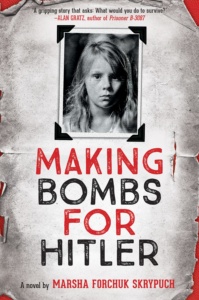 Lida thought she was safe. Her neighbors wearing the yellow star were all taken away, but Lida is not Jewish. She will be fine, won’t she?
Lida thought she was safe. Her neighbors wearing the yellow star were all taken away, but Lida is not Jewish. She will be fine, won’t she?
But she cannot escape the horrors of World War II.
Lida’s parents are ripped away from her and she is separated from her beloved sister, Larissa. The Nazis take Lida to a brutal work camp, where she and other Ukrainian children are forced into backbreaking labor. Starving and terrified, Lida bonds with her fellow prisoners, but none of them know if they’ll live to see tomorrow.
When Lida and her friends are assigned to make bombs for the German army, Lida cannot stand the thought of helping the enemy. Then she has an idea. What if she sabotaged the bombs… and the Nazis? Can she do so without getting caught?
And if she’s freed, will she ever find her sister again?
This pulse-pounding novel of survival, courage, and hope shows us a lesser-known piece of history — and is sure to keep readers captivated until the last page.
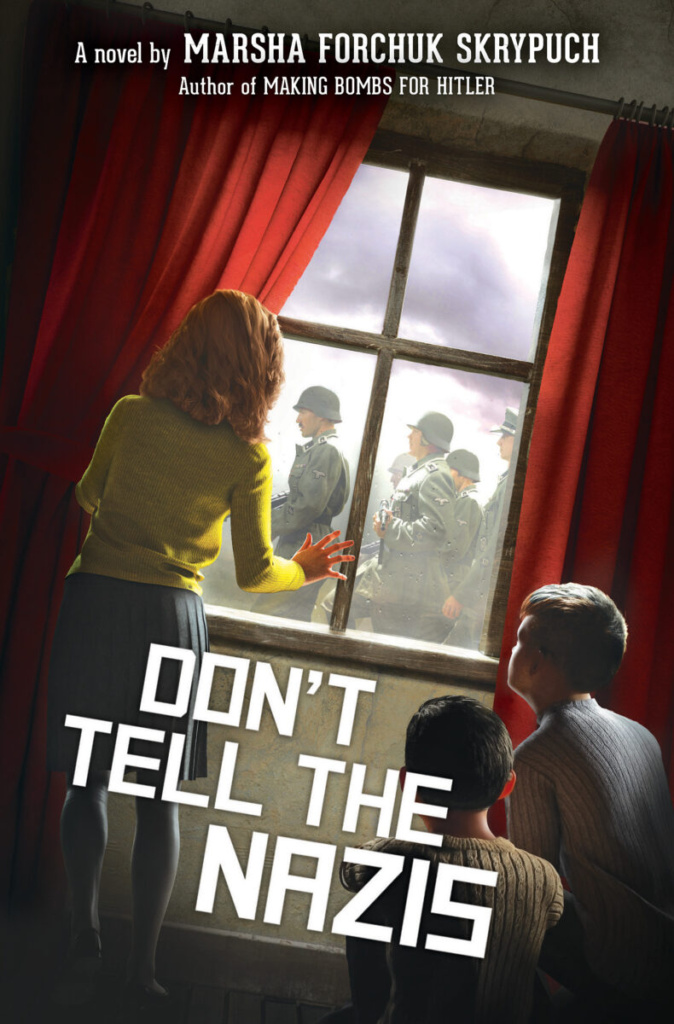
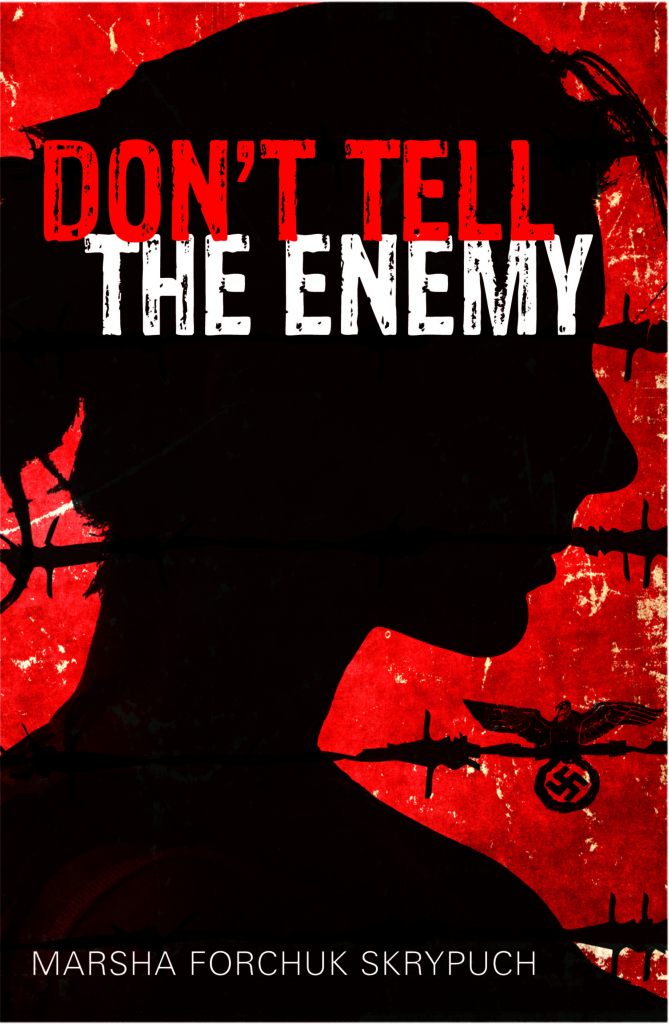
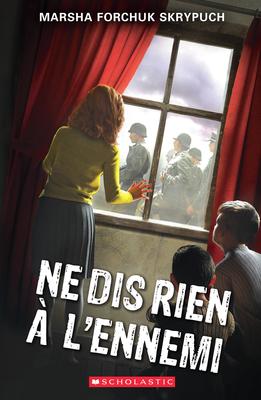
Previously published in Canada as Don’t Tell the Enemy.
Krystia’s family is hiding Jews from the invading Nazis, but the risks are immense. How much will she risk for her friends? A gripping story based on true events.
During the Soviet occupation of Ukraine during World War II, some of Krystia’s family are harrassed; others are arrested and killed. When the Nazis liberate the town, they are welcomed with open arms. Krystia’s best friend Dolik isn’t so sure. His family is Jewish and there are rumours that the Nazis might be even more brutal than the Soviets.
Shortly after the Nazis arrive, they discover a mass grave of Soviet prisoners and blame the slaughter on the Jews. Soon, the Nazis establish ghettoes and begin public executions of Jews.
Krystia can’t bear to see her friends suffering and begins smuggling food into the ghetto. When rumours circulate that the ghetto will be evacuated and the Jews will be exterminated, Krystia must decide if she’s willing to risk her own family’s safety to save her friends.
Continue reading “Don’t Tell The Nazis”